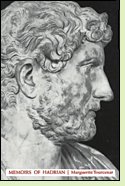Memoirs of Hadrian
by Marguerite Yourcenar
Reviewed by David Maclaine

Memoirs of Hadrian is the result of Marguerite Yourcenar’s obsessive effort to immerse herself in her subject by what she describes as “a method akin to controlled delirium,” diving deeply into the life of “a man who was almost wise.” Her “Reflections on the Composition of Memoirs of Hadrian” at the back of my edition also makes clear she knew that her effort to delve so deeply into the soul of the third of the “Good Emperors” led away from the style and focus that could produce a popular novel. Early in the book, an episode that would have generated pages of excitement in a tale of action and adventure becomes a single sentence: “Two hours later I was attacked at the ford of a river; the assailants wounded my orderly and killed our horses.” Clearly, this is not that kind of novel.
What it is, as the title suggests, is a first-person narrative in which Emperor Hadrian looks back on his life from very near its end and tries to form conclusions, both about the value of his own life and the nature of virtue itself. This is a novel of philosophical rumination woven around the narrator’s road to power; his public life, including his decision to preserve peace by pulling the empire back into defensible boundaries; his great programs of city-building and other public works; and his private explorations: religious mysteries, the pursuit of virtue, love. The last manifests in the great joy and tragedy of his personal life, his attachment to Antinous, a beautiful young man whose death comes early but whose face still endures in a multitude of sculptures commissioned by his grieving lover. Readers who want a rich portrait of the empire at its peak, and who are also lured by deeper questions about the ideal of the good life will find Yourcenar’s novel very rich indeed. (1951 in the original French, English editions in the 300-400-page range)
More about Memoirs of Hadrian at Powell's Books or Amazon.comMemoirs of Hadrian appears on the list of The 50 Best Historical Novels for a Survey of Ancient Roman History
Other novels set during Hadrian's reign:
Empire by Steven Saylor (2010), a sweep-of-history novel about imperial Rome from 14 A.D., the end of Caesar Augustus's reign to the death of Hadrian in 141 A.D. See review or more info at Powell's Books
Eromenos by Melanie McDonald (2011), about the youth Antinous of Bithynia and his seven-year affair with Emperor Hadrian. More info
Threshold of Fire by Hella S. Haasse (1993), about the Christian persecutions of pagans in Rome during the time of Emperor Hadrian. More info
Nonfiction about Emperor Hadrian:
Hadrian: Empire and Conflict by Thorsten Opper (2010). More info
Hadrian: The Restless Emperor by Anthony R. Birley (1997). More info
Beloved and God: The Story of Hadrian and Antinous by Royston Lambert (1997), about Emperor Hadrian and the teenaged boy who was his lover. More info
Online:
The Life of Hadrian from the Historia Augusta, English translation online at the University of Chicago website
Back to Novels of Ancient History
Back to Directory of Book Reviews